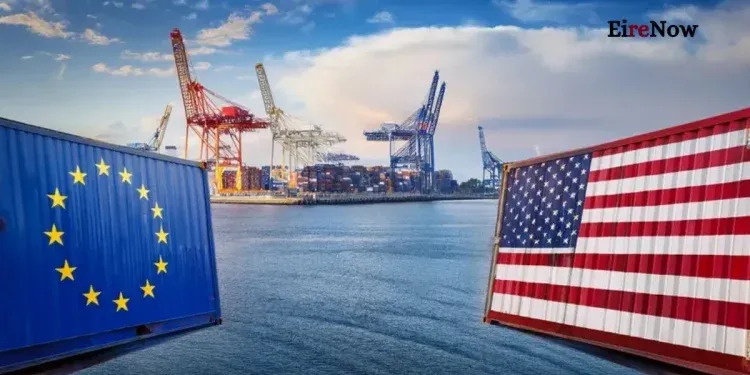Tánaiste and Minister for Foreign Affairs and Trade Simon Harris has welcomed the “clarity” provided by the new EU-US framework trade agreement, which confirms a single, all-inclusive 15% tariff on most EU goods, including pharmaceuticals and semiconductors.
The deal, announced today, comes after months of negotiations and provides a significant “shield” for Irish exporters, according to Mr. Harris, who said it prevents them from being subjected to potentially much larger tariffs from ongoing US investigations.
The joint statement, spanning three and a half pages, also includes “zero for zero” tariff carve-outs for aircraft and aircraft parts. The Tánaiste noted that further tariff reductions are expected to be negotiated for other products, including certain generic pharmaceuticals and chemicals, and that the door is open for future negotiations on items of “strategic common interest.”
The US and EU had previously announced the framework deal on July 27, following a meeting between US President Donald Trump and European Commission President Ursula von der Leyen. The joint statement released today formalises the commitments made by both sides.
Under the agreement, the EU has pledged to eliminate tariffs on all US industrial goods and to provide preferential market access for a range of US agricultural and seafood products. In return, the US will take steps to reduce its current 27.5% tariffs on cars and car parts. This auto tariff relief will take effect once Brussels introduces the necessary legislation to enact its promised tariff cuts on US goods.
A senior US administration official, speaking on condition of anonymity, said they are “very interested in moving quickly” and that European carmakers could see relief from the current US tariffs within “hopefully weeks.” The official described the joint statement as a way for both sides to “hold each other accountable.”
The statement also confirmed that the US will apply only Most Favored Nation tariffs on EU aircraft and parts, generic pharmaceuticals, and certain other products from September 1. It further noted the EU’s intention to procure $750 billion in US liquefied natural gas, oil, and nuclear energy products, along with an additional $40 billion of US-made artificial intelligence chips. The EU also plans to invest an additional $600 billion across US strategic sectors up to 2028.
Both sides have committed to addressing “unjustified digital trade barriers” and to negotiating rules of origin to ensure the agreement’s benefits accrue primarily to the two trading partners. They also agreed to explore cooperation on steel and aluminum markets.
In a separate statement, Mr. Harris acknowledged the impact of higher tariffs and the existing difficulties faced by many Irish exporters this year, but maintained that the deal provides much-needed certainty for businesses. Sources and related content







